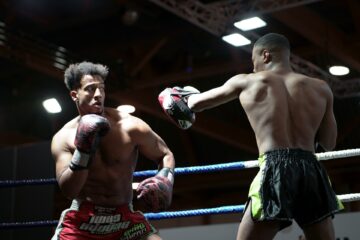![]()
Introduction:
ICC Development Ltd. v. Arvee Enterprises & Anr[1] was the first decision in the Indian legal regime to address the issue of publicity and personality rights in sports. This article attempts to examine personality rights in the context of athletes by analyzing this emblematic case, which was decided in the year 2003.
It’s usually seen that celebrated personalities live differently. They are recognized easily from their voice, pictures, signatures or even similarities. While this has some advantages, it makes them vulnerable to imitation. This is where the right to publicity comes in, it’s recognized as part of a celebrity’s intellectual property rights. It helps a personality to legally protect its personality from imitation or unauthorized use. It refers to the right to regulate the use of a person’s name, picture and to prevent another person from using it for commercial purposes without their consent. Along with the right to privacy, as guaranteed by the Constitution, these two rights form the personality rights. With the help of the case mentioned above, we are going to study personality rights in the context of athletes.
Brief Facts of the Case
- ICC Development Ltd. (IDL), the plaintiff was established by members of the International Cricket Council (ICC) to own and control their commercial rights, including media rights, notices, and other intellectual property rights, in connection with the ICC events.
- IDL was the organizer of the ICC Cricket World Cup, which took place from February 8 to March 23, 2003, in South Africa, Zimbabwe, and Kenya.
- For this purpose, IDL had created a distinctive logo and mascot for the event and had filed applications for trademark registration in several countries including India where it had filed applications for the registration of the words “ICC Cricket World Cup South Africa 2003” and the logo along with the mascot “Dazzler”.
- Subsequently, the defendants Arvee Enterprises, an authorized dealer for the sale and service of electronic products by Philips India Ltd. started a sales promotion strategy where they were offering Cricket World Cup tickets as prizes, using the slogans “Philips: Diwali Manao World Cup Jaao” and “Buy a Philips Audio System win a ticket to the World Cup 2003”, adding a picture of a ticket with an imaginary seat and gate number saying “Cricket World Cup 2003”.
- After getting to know about this, the Plaintiff, IDL filed a suit in Delhi High Court for an injunction preventing the defendants from posting advertising in any way related to the plaintiff and the “World Cricket Championship”.
Issues
A threefold issue that arose, in this case, was regarding personality rights:
- Whether the defendants misrepresented their connection to the plaintiffs and the World Cup.
- If the defendants illegally attempted to obtain a commercial gain from this misrepresentation.
- If the defendants have disadvantaged the sponsors of the World Cup by enjoying the exclusivity of the rights granted to them.
Arguments by the Parties
The Plaintiff
The plaintiff[2] essentially made a four-part claim regarding the defendant’s alleged infringing actions:
- The defendants deliberately misrepresented their connection to the plaintiffs during the World Cup through their marketing intending to make an undeserved economic profit from such association, by advertising in media, including newspapers, television, magazines and the Internet. This led to an infringement of the personality rights of the plaintiffs.
- The defendants were in the same line of business as the plaintiffs, and therefore, their actions should be interpreted as malicious and dishonest with the intention of bringing the World Cup and its sponsors into disrepute.
- The terms and conditions of the distribution of tickets expressly prohibit the distribution of tickets by defendants; unless the plaintiff grants permission for it, their actions can be viewed as an ambush marketing case. To take advantage of the World Cup event without investing anything towards success.
- The defendants deprived the sponsors of the World Cup of the exclusivity of the rights which were granted to them and prevented the plaintiffs from performing their contractual obligations.
The Defendants
The defendants justified their actions in the following manner:
- The defendants justified their actions by stating that the words “World Cup” were simply used generically, as they were proved by the fact that they didn’t connect it to the prominent logo connected to the plaintiff, or the full phrase ‘ICC Cricket World Cup South Africa 2003.’
- The tagline in the advertising just implies that the winner can get a ticket or tour package from a travel company to see the World Cup event. Their advertising in no way creates any similarities or confusion in the mind of a reasonable person that the advertisers are the sponsors of the event.
- The defendants did not intend to establish an association or affiliation with the Plaintiffs.
- The “World Cup” is a general word and has been used to refer to several other international sporting events. Neither is it protected by any international treaty or national law, like the word “Olympic” and its logo, which is protected by the Emblems and Names (Prevention of Improper Use) Act 1950.
- Concerning the ticket conditions, the defendants claimed that they had booked tickets and travel packages through the authorized tour operator and agent, and the terms of the tickets were never disclosed or were brought to their notice and that the same is against public policy.
Analysis
Before analyzing the judgment of the court in this historic case, it is necessary to conduct a thorough analysis of the relevant concepts mentioned by the defendants and the plaintiffs in their arguments.
Celebrity and Personality Rights
Personality rights[3] recognize the commercial value of a famous person and protect the celebrity’s property in the profitability of his public image. In India, this right is not guaranteed by law, but the courts have taken note of this right and put in place a legal framework for redressing complaints.
Personal rights mainly extend to celebrities. Essentially, the personality rights include within its scope the physical characteristics of the celebrity, such as the face, unique hairstyle, voice etc. It includes the name of the actor, photographs, video clips, or even the celebrity’s signature. Unique movements that are specific to celebrities, such as taking off glasses like Rajnikanth, can also be considered as a personality trait of that person. In short, it encompasses all of those traits and qualities of a person that are central or helpful to him being a celebrity.
The highest requirement for the expansion of personal or celebrity rights is, therefore, public perception, i.e., whether a person has attracted public attention or not, the person must justify a certain degree of fame and recognition. It means that personality rights also extend to athletes.
Personality Rights in Sports
In Europe, organizations have used the images and personality rights of the players[4] to generate huge profits. In September 2013, Real Madrid bought Welsh footballer Gareth Bale for a world record transfer fee of €85.3 million. In return, he assigned 50% of his image rights to Real Madrid, which ultimately helped the club recoup the massive investment by using his image rights to sell merchandise and other product sponsorships. It also helps in deciding the salaries of the players, with players like David Beckham incorporating companies for their name and image helps in tax planning.
Also, players like Sachin Tendulkar have taken a step further in protecting their image by trademarking their name for their websites only.
In year2016, an example of a personality rights dispute, an issue arose with the appointment of Jose Mourinho (manager of England’s Manchester United) between Manchester United and Chelsea. Chelsea wanted to use his personality rights ceased by United as they owned several EU trademarks for his name, signature and many other things like his image rights were owned by them. Eventually, the problem was resolved when United gave in and paid Chelsea a specific undisclosed amount (approximately around €1 million) to acquire Mourinho’s image rights.
Relation between Passing Off and Personality Rights
Passing off means misrepresentation by receiving other goods or services the act; thus causes loss of the actual owner of the property, resulting in harming the goodwill and causing economic loss and reputation loss of the actual owner.
In the case of Micolube India Ltd .v. Maggon Auto Centre, thecourt[5] held that in the suit for passing off, the petitioner has to prove that the consumer was; misled and induced to purchase the product and that the product is; branded with the first user of the mark. In particular, a trademark can only be registered, if the trademark has any secondary meaning i.e., it has some kind of a distinctive character about the product being sold. In another case, it was held that a suit for passing off depends on proof that the previous user has goodwill.
So how does the violation of personality rights lead to a suit of passing off? That is because the violation of a person’s publicity rights often takes the form of deception which damages the goodwill of the personality, which in turn leads to economic losses and loss of reputation of that personality.
Courts Judgement on the Case
ICC Development v. Arvee Enterprises; was the first ruling of the Indian legal regime that dealt with publicity and personality rights the judgement of this case was given by Hon’ble Judge S.K. Agarwal. From the understanding of personality rights and their connection with sports as mentioned above, it is important to take into account the principle set out in this judgement. The plaintiff alleged that the defendants had passed off their association with the World Cup and that their personality and publicity rights had therefore been violated, but the court did not agree, as it believed that personality rights are derived from the right to privacy[6] and applies to an individual. Therefore the court held that the Right of Publicity does not extend to non-living subjects. An individual can acquire the right of publicity by his association with an event. However, this right does not apply to the event in question, nor the organizer of the event. Any attempt to take away the right of publicity from the individual to the organizer (non-human entity) of the event would violate Articles 19 and 21 of the Constitution of our nation. The right to publicity belongs to an individual and, only he has the right to benefit from it.
Also, concerning passing off, the defendant does not use any of the plaintiff’s products or services but simply; creates a slogan using the term “World Cup” as generic and not exclusive as it was the dictionary term for an event or tournament involving several countries. The intention of the slogan is only to send the message to people that those who buy their products have a chance to win a ticket to the World Cup. No reasonable man was convinced or under the mistaken impression that the defendants were the sponsors of this event. As a result, no form of loss of reputation or economic loss was incurred by the plaintiffs. As there is no element of unfair competition or illegal appropriation, the defendants cannot be held responsible for passing off, as the basic principle of passing off; is not seen here.
On Breach of ticket conditions, the court held that IDI’s claim that Philips violated the ticket sales conditions, which expressly prohibited the use of tickets for promotion or as a competition prize, was dismissed by the court because Philips purchased the travel packages from the Indian sub-agent of the official tour operator of IDI, and the terms have never been brought to the attention of Philips.
Given the foregoing, the Hon’ble Court refused to grant an injunction in favour of the plaintiff.
Conclusion
This landmark judgement[7] was unique in that it was the first Indian Case to recognize personality rights. A step in the right direction, but it was incomplete nonetheless. With a growing trend towards aggressive and momentary marketing, the need to protect personality rights is becoming more evident day by day. Different celebrities are also involved in promoting brands and companies. In this scenario, the publicity rights prevent the unauthorized appropriation of images and using their personal information for commercial purposes. There is a need for more exposure which will lead to more opportunities which in turn leads to several legal issues. Although the protection given by Article 21 derives from the right to privacy, it’s believed that due to the growing complexity of this problem, a proper codified law would be more appropriate.
References:
[1] ICC Development (International) .v. Arvee Enterprises & Anr, 2003 VIIAD Delhi 405, 2003(26) PTC 245 Del, 2004 (1) RAJ 10.
[2] Ashlesha Suryavanshi, ICC Development International Ltd v. Arvee Enterprises Ltd [2003], LL.B MANIA (Aug. 03, 2021), https://llbmania.com/2021/08/03/icc-development-international-ltd-v-arvee-enterprises-ltd-2003/
[3] M.Sai Krupa, Personality Rights in Indian Scenario, KHURANA AND KHURANA (Feb. 26, 2018, 12:44 PM), https://www.khuranaandkhurana.com/2018/02/26/personality-rights-in-indian-scenario/
[4] Divyakshi Jain, Personality Rights in Sports, LEXLIFE INDIA (Apr. 06, 2021), https://www.google.co.in/amp/s/lexlife.in/2021/04/06/personality-rights-in-sports/amp/
[5] Micolube India Ltd v. Maggon Auto Centre, 2008 (38) PTC 271 (Del.) (DB).
[6] Siddharth Jain & Sanyam Jain, Publicity Rights in India: A Misconception!, JOURNAL OF INTELLECTUAL PROPERTY STUDIES (July 07, 2020), https://journalofipstudies.files.wordpress.com/2020/vol-3-issue-2-6.pdf
[7] Abanti Bose, Personality right in sports: ICC Development (International Ltd.) v. Arvee Enterprises & Anr., iPLEADERS, (Aug. 25, 2021), https://blog.ipleaders.in/personality-rights-sports-icc-development-international-ltd-v-aree-enterprises-anr/



0 Comments